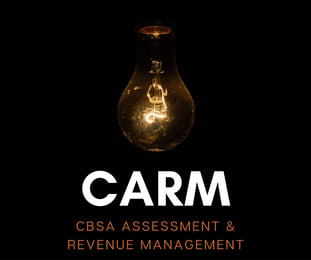CARM Simplified: Step #3 - CARM Import Bonds (Financial security)
Cole’s easy-does-it guide to making the transition to CARM
The first post in our CARM Simplified series gave you an Overview of CARM, the CBSA Assessment and Revenue Management project:
- what it is,
- what it means to importers, and
- what you’ll need to do to prepare.
Now, we’ll get into the nitty-gritty of getting yourself and your business prepared for CARM. In this post, we’ll cover financial security. Next week, delegation. And in our final part, we’ll tackle the CARM Client Portal (CCP).
Financial security for CARM: what is changing?
Commercial importers need to post security in order to participate in the Release Prior to Payment (RPP) privilege program.
The major change with CARM is that rather than your customs broker providing RPP financial security on your behalf, you—the importer—are required to provide your own security to clear shipments with Release Prior to Payment privileges.
How do I post security for CARM?
You’ve got two options, an annual surety bond or a cash deposit.
Surety Bond: calculated on 50% of your highest monthly payments to CBSA, by you or your broker within the prescribed 12 month period. The proposed minimum bond amount for CARM R2 is $25,000 per import program (RM).
Cash Deposit: 100% of your highest monthly payments to CBSA by you or your broker within the prescribed 12 month period.
To determine your highest monthly accounts receivable, look at the 12-month period between July 25th of last year to July 24th of the current year. Importers who don’t have a 12-month history of accounts receivable can make an estimate.
Please note: Although you are required to renew your bond annually, CBSA will be monitoring bond utilization in real-time in the CARM Client Portal. CBSA reserves the right to request an increase to your bond at any time.
Wait, I need to put down $25,000?
If the minimum bond amount is $25,000, that is not the amount you’ll pay. A bond fee is much lower—a fraction of the bond amount. Bond fees may change based on competition and demand. Make sure to ask what the bond fee is from your surety company.
The bond amount is generated based on your BN9 (your overall nine-digit business number) however, a minimum bond amount must be allocated to each BN15 (RM Import Program). The security is easier to allocate to each RM once you have your bond in place.
We highly recommend you get your bond in place early. It will avoid high-volume delays and help you with the transition to the CARM bonding environment. It may be a significant change today, but it will make things much easier in the long run.
How do I get a bond?
You should get your bond through an approved surety bond provider or your customs broker.
If you deal directly with a surety company, be sure they are well experienced in Canada Customs bonds and are up-to-date with current and future CARM requirements.
Cole can help you get your bond! CLICK HERE to submit a request and one of our CARM representatives will contact you directly.
What happens once I get my bond?
Once you are bonded, you’ll need to make payments at month end directly to CBSA effective the next billing cycle. Importer direct security (IDS) shifts after the first Statement Of Account (SOA), so the 25th of the month.
This potentially represents a big change for some importers, especially those who are accustomed to paying with terms.
Here’s what to do:
- Review your internal accounts payable processes and adjust them accordingly
- Set up electronic accounts payable with CBSA. Online banking is the most efficient and common, but there are other options such as using credit cards through the new portal.
We recognize this may represent a huge change for some importers—and that you may not be interested in making this change so far in advance of CARM becoming mandatory.
Why you should get your bond now (and not later)
The main advantage to getting your annual surety bond set up now (even though it means starting direct payments to CBSA early) is that 235,000 other importers will be doing the same thing between now and full implementation.
Doing it early avoids the huge backlog we expect in the spring (which could potentially disrupt your cycle), and it avoids the potential price increases that follow huge demand.
Need more support?
We’re ready to help!

